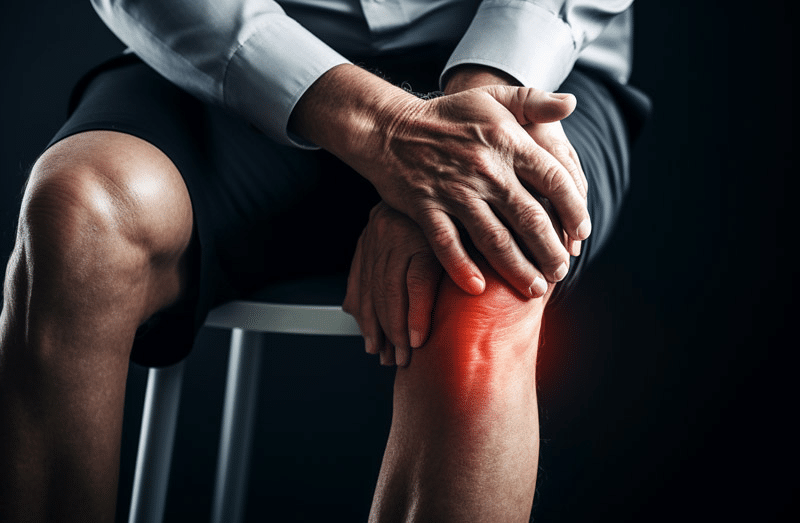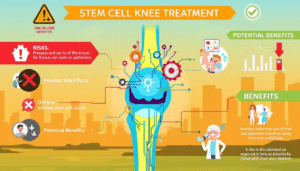In the intricate landscape of medical innovation, the utilization of stem cells holds promising prospects for addressing the challenges posed by knee arthritis. Knee arthritis, a prevalent condition causing pain and limited mobility, has spurred the exploration of regenerative approaches such as stem cell therapy.
Stem cells, renowned for their regenerative capabilities, offer a beacon of hope in the realm of arthritis treatment. This article delves into the world of stem cells and their potential application in mitigating knee arthritis symptoms, exploring various aspects from causes and symptoms to treatment options and patient experiences.
Join us on this journey to unravel the intricate interplay between stem cells and knee arthritis, shedding light on a transformative avenue in the quest for effective stem cell innovative medical solutions.
What is Stem Cells Arthritis Knee Treatment?

Stem cells arthritis knee treatment refers to an innovative therapeutic approach utilizing stem cells, particularly mesenchymal stem cells, to address knee arthritis. This advanced treatment involves harnessing the regenerative potential of these cells, often sourced from bone marrow, to promote tissue repair and alleviate symptoms associated with knee arthritis.
Stem cell therapy holds promise in providing an alternative to traditional treatments, aiming to enhance the body’s natural healing mechanisms and potentially improve the quality of life for individuals with knee arthritis. These stem cells may hold the potential to activate or speed up recovery where other treatments have failed.
Knee arthritis is a condition characterized by inflammation and degeneration of the knee joint, leading to pain, stiffness, and reduced mobility. The most common types include osteoarthritis, rheumatoid arthritis, and post-traumatic arthritis.
Understanding Knee Osteoarthritis and Knee Pain

Osteoarthritis, often associated with wear and tear, involves the breakdown of joint cartilage. Rheumatoid arthritis is an autoimmune disorder causing inflammation, and post-traumatic arthritis develops after joint injuries. Knee Osteoarthritis can significantly impact daily activities, and various treatments, including stem cell therapy, aim to alleviate symptoms and promote joint health.
We aimed to review the evidence of autologous mesenchymal stem cell therapy on pain, function and severity on imaging. This was a prospective, single-blind, placebo-controlled trial of bone marrow aspirate concentrate for knee osteoarthritis.
The cell treatment group demonstrated higher incidences of pain and swelling than the control group after injection, but no recurrence of knee pain was identified. Surgeons take articular cartilage from a healthy part of the knee that doesn’t bear weight and use it to repair a small area of damaged knee cartilage.
Adult stem cells that exist throughout the body in tissues such as skin, bone marrow, blood, brain matter, skeletal muscles, etc. Recovery from a total knee replacement is long and frustrating and, with age, the likelihood of experiencing these risks increases.
Compared to the risks associated with knee replacement surgery, stem cell therapy utilizing adult stem cells is minimal and considered safe. When ready, the implant is trimmed to fit the cartilage defect and secured in place with fibrin glue.
Researchers are studying the safety and effectiveness of a single-step cartilage repair process that combines a patient’s own cartilage cells with donor stem cells. Embryonic stem cells that come from embryos that form during the blastocyst phase of development.
Significant of Stem Cells Arthritis Knee OA Treatment Potential

Knee arthritis, a prevalent condition causing joint pain and impaired mobility, has spurred ongoing research into innovative treatments. Stem cell therapy emerges as a promising avenue, harnessing the body’s natural regenerative abilities to combat arthritis-induced damage.
Regenerative Power of Stem Cells & Stem Cell Technology
Stem cells, particularly mesenchymal stem cells derived from sources like bone marrow, play a pivotal role. These cells possess unique properties, including the ability to differentiate into various cell types, making them ideal for tissue repair.
Non-Invasive Approach
Unlike traditional surgical interventions, stem cell therapy offers a non-invasive alternative. The procedure typically involves extracting stem cells, processing them, and then strategically injecting them into the affected knee joint.
For patients suffering from knee osteoarthritis and similar disorders, stem cells may be the non-invasive approach you’ve been looking for to address pain and injuries of this nature.
Cartilage Regeneration
One of the primary objectives is to stimulate cartilage regeneration. Mesenchymal stem cells have demonstrated the potential to encourage the growth of new, healthy cartilage, addressing a key concern in knee arthritis.
Reducing Inflammation
In addition to promoting tissue repair, stem cells have anti-inflammatory properties. This can alleviate the chronic inflammation associated with arthritis, offering relief from pain and swelling.
Enhancing Joint Function
The ultimate goal is to enhance joint function, allowing individuals to regain mobility and experience a better quality of life. Stem cell therapy aims to not only manage symptoms but also address the underlying causes of knee arthritis.
Considerations and Research
While early studies and clinical trials show promise, ongoing research is crucial for validating the long-term efficacy and safety of stem cell therapy for knee arthritis. Individuals considering this innovative treatment should consult with healthcare providers to explore its suitability for their specific condition.
Stem cell therapy for knee arthritis represents a pioneering approach that holds immense potential for transforming the landscape of arthritis treatment, offering hope for improved outcomes and a more active life for those affected.
Causes and Symptoms of Knee Arthritis

Knee Arthritis Causes
Knee arthritis, a multifaceted condition, stems from various factors. Osteoarthritis, often linked to aging and wear and tear, is a prevalent cause. Inflammatory types, such as rheumatoid arthritis, involve the immune system mistakenly attacking the joints. Post-traumatic arthritis may develop after injuries to the knee.
Symptoms Unveiled
Recognizing knee arthritis involves understanding its distinct symptoms. Pain and stiffness are hallmark indicators, especially during activities or after periods of inactivity. Swelling around the joint, a diminished range of motion, and a grating sensation known as crepitus may manifest.
Progression and Impact
As knee arthritis progresses, symptoms intensify, impacting daily life. Individuals may experience difficulty walking, climbing stairs, or even engaging in routine tasks. The joint’s structural changes contribute to the evolving symptomatology.
Risk Factors at Play
Several risk factors contribute to the development of knee arthritis. Age, genetics, obesity, joint injuries, and gender (more prevalent in women) all play roles. Understanding these risk factors aids in both prevention and early intervention.
Early Detection Matters
Early detection of knee arthritis allows for timely interventions and management. Monitoring symptoms and seeking medical advice can mitigate the impact of arthritis, enhancing the effectiveness of treatments, including innovative approaches like stem cell therapy.
Exploring the causes and symptoms of knee arthritis provides a comprehensive foundation for addressing this widespread condition. From understanding risk factors to recognizing early signs, this knowledge forms a crucial guide for individuals navigating the complexities of knee arthritis.
Factors Leading to Stem Cells Knee Arthritis

Knee arthritis, a prevalent condition with diverse etiologies, involves a comprehensive exploration of contributing factors. Understanding these elements sheds light on the complexities of knee arthritis development.
Osteoarthritis (OA)
A primary factor is osteoarthritis, often associated with aging and wear-and-tear on the knee joint. As the protective cartilage breaks down, bones can rub against each other, causing pain and stiffness. When referring to arthritis of the knees, we call this knee osteoarthritis.
Stem cells may be a regenerative medicine option that’s perfect for the treatment of knee osteoarthritis when other methods have failed or delivered poor results in the past.
Inflammatory Arthritis
Inflammatory forms, such as rheumatoid arthritis, result from an immune system malfunction that attacks the synovium, a protective membrane around the joints. This chronic inflammation can lead to joint damage.
Post-Traumatic Arthritis
Injuries, fractures, or dislocations involving the knee can contribute to post-traumatic arthritis. These events disrupt the joint’s natural alignment, accelerating the breakdown of cartilage.
Genetic Predisposition
Genetics play a role in predisposing individuals to knee arthritis. Specific genetic factors may influence how joints develop and respond to stress, contributing to the onset of arthritis.
Obesity and Joint Overloading
Excessive body weight is a modifiable risk factor linked to knee arthritis. Obesity places additional stress on the knee joints, accelerating cartilage breakdown and increasing the risk of developing arthritis.
Joint Infections
Infections affecting the knee joint, though less common, can lead to arthritis. Bacterial, viral, or fungal infections can initiate an inflammatory response, causing damage to the joint structures.
Understanding these diverse factors influencing knee arthritis underscores the importance of a multifaceted approach to prevention, early detection, and effective management. By unraveling the complexity of these contributing elements, individuals can make informed choices to mitigate the risk and impact of knee arthritis.
Regenerative Orthopedic Injection Therapy

Regenerative Orthopedic Injection Therapy (ROIT) stands as an advanced orthopedic approach harnessing the body’s natural healing processes. This minimally invasive outpatient procedure involves injecting substances like stem cells directly into damaged joints, tendons, or ligaments.
ROIT integrates various components, such as stem cell therapy and prolotherapy, tailored to the patient’s specific condition and anatomy. This innovative therapy targets conditions like osteoarthritis, tendinitis, ligament injuries, and degenerative joint diseases, aiming to stimulate tissue repair and reduce inflammation.
Mesenchymal Stem Cells May Deliver Significant Improvement in Pain
Patients often report benefits like diminished pain, improved joint functionality, and reduced reliance on medications or surgery. While ongoing research seeks to validate ROIT’s efficacy, positive outcomes in testimonials and case studies highlight its potential as a promising alternative or complementary orthopedic solution.
ROIT marks a transformative shift in orthopedic medicine, offering new avenues for individuals grappling with musculoskeletal challenges. As advancements and research progress, the applications of ROIT continue to evolve, providing patients with effective and minimally invasive orthopedic care alternatives.
Regenerative Medicine: Helping the Body Heal Itself

Regenerative Medicine is a revolutionary field that focuses on harnessing the body’s innate ability to repair and rejuvenate damaged tissues. Utilizing advanced techniques like stem cell therapy, platelet-rich plasma (PRP), and growth factors, this discipline aims to stimulate natural healing mechanisms.
Stem cell therapy, a cornerstone of Regenerative Medicine, involves the use of potent cells capable of differentiating into various cell types, fostering tissue regeneration.
The applications of Regenerative Medicine extend across various medical specialties, including orthopedics, cardiology, and dermatology. This innovative approach holds promise for treating conditions like osteoarthritis, tendon injuries, and chronic wounds, among others.
By promoting tissue regeneration at a cellular level, Regenerative Medicine offers a paradigm shift from conventional treatments, aiming for long-term healing rather than merely symptom management. Ongoing research and advancements continue to expand the scope of Regenerative Medicine, making it a forefront solution in the quest for optimal health.
Traditional Treatment of Osteoarthritis

Traditional treatment methods for osteoarthritis primarily focus on managing symptoms and improving joint function. Nonsteroidal anti-inflammatory drugs (NSAIDs) like ibuprofen are commonly prescribed to alleviate pain and reduce inflammation associated with osteoarthritis.
Physical therapy plays a crucial role in traditional management, with tailored exercises aimed at strengthening muscles, enhancing joint flexibility, and improving overall function. Lifestyle modifications, such as weight management and avoiding excessive joint stress, are emphasized to mitigate the progression of osteoarthritis.
Intra-articular corticosteroid injections may be administered to provide temporary relief by reducing inflammation within the affected joint. In severe cases, surgical interventions like joint replacement surgery may be considered to address advanced osteoarthritis.
While traditional treatments aim to enhance the quality of life for individuals with osteoarthritis, emerging approaches like Regenerative Medicine, including stem cell therapy, offer novel avenues for addressing the root causes and promoting long-term joint health. Ongoing research continues to refine and expand the array of treatment options available for osteoarthritis.
How are Regenerative Cellular Therapy Injections Performed?

Regenerative cellular therapy injections involve a minimally invasive procedure designed to harness the healing potential of the body’s own cells. The process typically includes the following steps:
Patient Evaluation: A thorough assessment of the patient’s medical history and condition is conducted to determine suitability for regenerative cellular therapy.
Cell Source Collection: Autologous cells, often derived from the patient’s bone marrow or adipose tissue, are collected through a minimally invasive procedure. Bone marrow aspiration or liposuction may be used to obtain these cells.
Cell Processing: The collected cells are processed to isolate and concentrate regenerative elements, such as mesenchymal stem cells and growth factors. This concentration enhances the therapeutic potential of the injected solution.
Injection Procedure: Using image-guidance techniques like ultrasound or fluoroscopy, the concentrated cell solution is precisely injected into the targeted area, such as an arthritic joint or injured tissue.
Promoting Healing: The injected regenerative cells work to stimulate natural healing processes, reduce inflammation, and promote tissue regeneration. This may contribute to improved joint function and alleviation of symptoms.
Post-Injection Care: Patients typically undergo a period of post-injection care, which may include restrictions on certain activities and guidance on optimizing the healing process.
Monitoring and Follow-Up: Patients are monitored for their response to the treatment, and follow-up appointments are scheduled to assess the long-term impact of regenerative cellular therapy.
It’s important to note that the specific details of the procedure may vary based on the type of regenerative cellular therapy used and the patient’s individual condition. As research in this field advances, procedural techniques continue to evolve, offering potential benefits for various musculoskeletal conditions.
Repairing and regenerating cartilage with Stem Cells

In addition to the core steps involved in repairing and regenerating cartilage with stem cells, there are several aspects that contribute to the overall effectiveness of this regenerative therapy:
Precision in Targeting Specific Areas
Advanced imaging technologies, such as magnetic resonance imaging (MRI) or ultrasound, enable precise targeting of specific damaged areas within the cartilage. This ensures that the therapeutic effects are concentrated where they are needed most.
Diversity of Stem Cell Types
Stem cells used in regenerative therapies may include mesenchymal stem cells (MSCs) and other cell types with regenerative potential. The diverse nature of these cells enhances their ability to differentiate into various cell types needed for cartilage repair.
Synergistic Effects with Growth Factors
Stem cell solutions often contain growth factors that synergize with stem cells to amplify the regenerative response. Growth factors stimulate cell proliferation, tissue repair, and the formation of a supportive extracellular matrix.
Minimizing Discomfort and Downtime
The minimally invasive nature of stem cell injections reduces discomfort and downtime for patients. Compared to more invasive surgical procedures, this approach offers a quicker recovery period.
Patient-Specific Treatment Plans
Tailoring stem cell therapy to the individual patient’s needs is crucial. Factors such as the extent of cartilage damage, overall health, and lifestyle considerations are taken into account to create personalized treatment plans.
Combining Therapies for Comprehensive Results
In some cases, stem cell therapy may be combined with other regenerative or supportive treatments. This holistic approach aims to address multiple aspects of joint health and optimize the overall outcome.
Ongoing Research and Innovation
Ongoing research in regenerative medicine continually refines techniques and explores new avenues for improving cartilage repair. Innovations may include the use of biomaterial scaffolds or bioactive substances to enhance stem cell efficacy.
Long-Term Monitoring for Sustainability
Long-term success involves monitoring patients to assess the sustainability of cartilage repair over time. Regular follow-up appointments and imaging help gauge the ongoing benefits of stem cell therapy.
The use of human umbilical cord-derived mesenchymal stem cells in clinical trials for treatment of knee OA faces the same challenges as clinical trials with other types of MSC in terms of stem cell handling. Harnessing the potential of induced pluripotent stem cells for regenerative medicine.
Are there any risks associated with stem cell therapy for knee arthritis using bone marrow-derived cells?
The use of bone marrow-derived cells in stem cell therapy for knee arthritis is generally considered safe. However, as with any medical procedure, there may be minimal risks, such as infection or bleeding at the extraction site. These risks are rare and can be mitigated with proper medical protocols and aseptic techniques.
It’s crucial to discuss potential risks and benefits with your healthcare provider to make an informed decision based on your individual health profile.
See a Significant Improvement in Your Life Today
Are you or someone you know grappling with the challenges of knee osteoarthritis or a cartilage defect? Embrace the potential of stem cell therapy for knee arthritis relief. If you’re looking for non-surgical alternatives or exploring regenerative approaches to manage knee pain, Stem Cells LA is here to assist you.
Contact us to schedule a consultation and learn more about the transformative benefits of stem cell treatments for arthritis in the knee. Take the initiative to enhance your knee health and explore how innovative stem cell therapies may contribute to reducing pain and improving mobility.
Contact Information:
???? Call or Text: 310-281-6160
???? Visit Us:
1970 S. Prospect Ave. Suite 2
Redondo Beach, CA 90277
Discover a path to wellness – we’re here to assist you!


